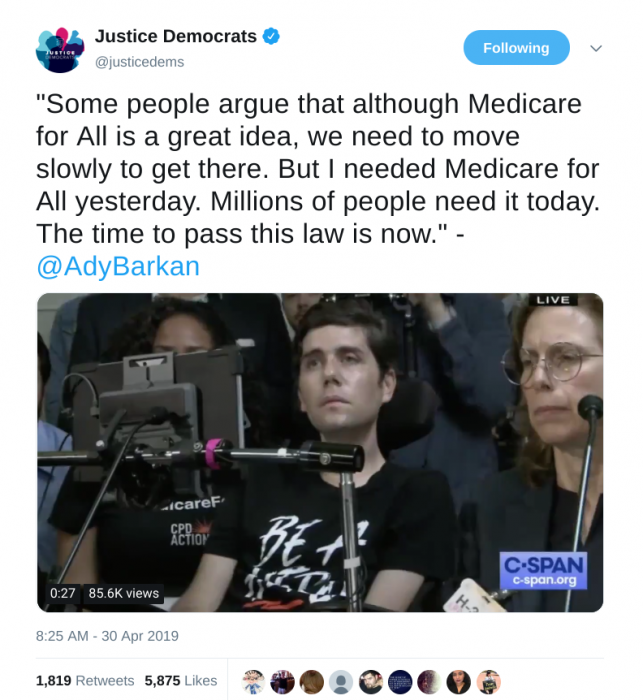What is Medicare for All?
nan said:
Ok, he was not clear--I just looked at the picture above.
If you watch the video it’s completely obvious who he’s talking about.
ridski said:
If you watch the video it’s completely obvious who he’s talking about.
I watched the video--I was the one who posted it. He was not clear who he was talking about because he said the guy on the left and I looked at the video and saw the CNN guy. He needs to explain better.
Why would I be talking about the guy who ran the 1 minute hand-raising poll rather than the extended debate by the three pundits that occupies 95% of the video?
dave said:
Why would I be talking about the guy who ran the 1 minute hand-raising poll rather than the extended debate by the three pundits that occupies 95% of the video?
I don't know what you want. I'm not a mind reader. What did Ben M. say that you found useful?
Just about everything he said. He's approaching the issue in a practical way.
dave said:
Just about everything he said. He's approaching the issue in a practical way.
Basically, he said that the details still have to be set out (including a transition from private to public, which isn't a simple concept). There will have to be some means of transitioning all the people who work for private companies (not executives, but the folks who toil in the trenches). Finally, the details have to be fleshed out in order to get genuine political support. It's not enough to just say "It'll happen and then everyone will be covered." That's not a plan, that's a concept.
I know another big promise is "No denials of procedures". That may or may not come about, again it depends on how it's set up. And even if MforA does pay for everything, if they're not paying enough some doctors won't do those procedures.
nohero said:
Basically, he said that the details still have to be set out (including a transition from private to public, which isn't a simple concept). There will have to be some means of transitioning all the people who work for private companies (not executives, but the folks who toil in the trenches). Finally, the details have to be fleshed out in order to get genuine political support. It's not enough to just say "It'll happen and then everyone will be covered." That's not a plan, that's a concept.
I know another big promise is "No denials of procedures". That may or may not come about, again it depends on how it's set up. And even if MforA does pay for everything, if they're not paying enough some doctors won't do those procedures.
There are models for this in other countries and there have been reports which I have posted examining the feasibility and it was determined that this model would give us the most bang for our buck. Of course every detail is not written out yet, but this is a sound model and one we should fight for and not fall for insurance company propaganda, that tells us to be afraid.
So many people do not have coverage now, they will take this model warts and all and this model covers the most at the best price. You are being the "ridgid purist" here.
Who is going to win this bet?
In Medicare-For-All Debate, Insurers Bet They're Loved More Than Bernie
nan said:
There are models for this in other countries and there have been reports which I have posted examining the feasibility and it was determined that this model would give us the most bang for our buck. Of course every detail is not written out yet, but this is a sound model and one we should fight for and not fall for insurance company propaganda, that tells us to be afraid.
So many people do not have coverage now, they will take this model warts and all and this model covers the most at the best price. You are being the "ridgid purist" here.
There are models in other countries, including countries that have private insurance as well as public insurance. There is NOT a model (that I know of) for switching over from a massive private system to an entirely public system. And that's what will be required for "M4A".
[Edited to add] And enough with the f-kin insults and characterizations, please.
nohero said:
"details still have to be set out (including a transition from private to public, which isn't a simple concept). There will have to be some means of transitioning all the people who work for private companies (not executives, but the folks who toil in the trenches). Finally, the details have to be fleshed out in order to get genuine political support. It's not enough to just say "It'll happen and then everyone will be covered." That's not a plan, that's a concept."
Ah yes, 'it's too complicated in the US' compared with the rest of advanced industrial countries - the last, bad faith refuge of opposition to M4A.
1) Other countries - Taiwan and Canada - have transitioned. Neither strictly identical to the US case, but both demonstrating the feasibility of legislation- and government-driven transition, despite its disruptions: both demonstrating superior health outcomes; both demonstrating lower costs due to getting rid of private insurance profits, private insurance administrative costs, and private sector medical and pharmaceutical price gouging.
2) Increasingly - and in step with increasing political support for it - Medicare for All literature (in Congress, in progressive think tanks, in public administration higher education departments) has mapped out transition plans. If you are ignorant of this literature, it is because you choose to be ignorant of it. And if you choose to be ignorant, it is because you oppose medicare for all for other reasons - and so don't want to face up to its feasibility.
3) Details must be "fleshed out" to "get genuine political support"? Obviously false, nohero: since the Sanders insurgency in the Democratic Party mainstreamed single payer in 2015-16, political support for medicare for all has steadily increased - without a detailed plan, and even when citizens are asked that million dollar question that fell on it's face in the Fox town hall, 'but what if it means your taxes go up?'
Citizens are 'transitioning' to support for a system where they'll pay less for healthcare-taxes than they pay for private insurance - but with better coverage and less hassle.
gvico said:
2) Increasingly - and in step with increasing political support for it - Medicare for All literature (in Congress, in progressive think tanks, in public administration higher education departments) has mapped out transition plans. If you are ignorant of this literature, it is because you choose to be ignorant of it. And if you choose to be ignorant, it is because you oppose medicare for all for other reasons - and so don't want to face up to its feasibility.
3) Details must be "fleshed out" to "get genuine political support"? Obviously false, nohero: since the Sanders insurgency in the Democratic Party mainstreamed single payer in 2015-16, political support for medicare for all has steadily increased - without a detailed plan, and even when citizens are asked that million dollar question that fell on it's face in the Fox town hall, 'but what if it means your taxes go up?'
Citizens are 'transitioning' to support for a system where they'll pay less for healthcare-taxes than they pay for private insurance - but with better coverage and less hassle.
Yes, details have to be fleshed out.
And don't presume anything about me just from your one ridiculous "analysis". That's insulting.
nohero said:
Yes, details have to be fleshed out.
And don't presume anything about me just from your one ridiculous "analysis". That's insulting.
You are aware that nothing you wrote supports your claim. Aren't you, nohero? As I wrote - and as you avoided responding to:
"Details must be "fleshed out" to "get genuine political support"? Obviously false, nohero: since the Sanders insurgency in the Democratic Party mainstreamed single payer in 2015-16, political support for medicare for all has steadily increased - without a detailed plan, and even when citizens are asked that million dollar question that fell on it's face in the Fox town hall, 'but what if it means your taxes go up?'
"And don't presume anything about me just from your one ridiculous "analysis". That's insul-"
Yea, yea, enough weaseling out of defending your claim. You pin your opposition on supposed political infeasibility of a transition. I've provided evidence that Medicare for All is politically feasible. Either make a case the political difficulties prevent it, that deals w/that evidence, or GET OUTA' HERE with your little wounded feelings whining.
Bernie Sanders wrote about Medicare for All today (05-02-19)
Opinion | Bernie Sanders: Medicare For All's Moment Is Here. Don't Back Down.
Those who make billions from our broken health care system will spend enormous amounts trying to divide us. But we cannot rest, and we cannot back down.
https://www.buzzfeednews.com/article/berniesanders2020/bernie-sanders-medicare-for-all
A decade ago, when I introduced legislation guaranteeing medical care to every American, the proposal was cast as a "radical" and "unrealistic" measure, and I could not convince a single senator to cosponsor the bill.
Ten years later, our Medicare for All bill has widespread support in the House and Senate, and polls show Medicare for All is supported by a majority of Americans, including a majority of Republicans.
As the House this week held historic hearings about Medicare for All, we must remember that this transformation did not happen by accident. It happened because Americans from all walks of life understand that we have a dysfunctional health care system designed to make huge profits for the drug companies and the insurance companies, while tens of millions remain uninsured or underinsured and we pay the highest prices in the world for prescription drugs.
And these Americans are now fighting back. They are not only resisting Trump's efforts to throw 32 million people off the health care they have; they are demanding that health care in the United States be considered a right, not a privilege.
Now, because of these grassroots efforts, we are on the verge of a historic victory — and that reality is prompting a backlash from the powerful special interests that continue to reap hundreds of billions of dollars from the status quo.
But our message must be clear: We must remember the lessons of history and refuse to back down.
This is not going to be an easy fight. To try to stop our movement’s momentum for Medicare for All, the insurance and pharmaceutical industries have recently formed a front group called the Partnership for America’s Health Care Future. In reality, this is a partnership to protect health industry profits. Through deceptive ads, the group’s goal is to try to persuade legislators to oppose Medicare for All, or divide and confuse us with weaker proposals.
This group’s members aren’t patients or consumers or people impacted by our current health care system — they are insurance companies and the pharmaceutical industry’s lobbying group. These groups spent $143 million on lobbying in 2018 to try to preserve a system that is a disaster for millions of Americans, but that is making big money for CEOs. In 2017 alone, while Americans were getting crushed by higher premiums and prescription drug prices, the top 65 health care CEOs made $1.7 billion in compensation, and the 25 highest-paid CEOs in the pharmaceutical industry made roughly $440 million.
So it should be no surprise that these companies and their political groups will spend enormous sums of money to try to stop us.
But let us be absolutely clear: These frantic attempts to derail our progress are a sign that we are winning — and that means we cannot rest, we cannot back down, and we cannot accept any substitute.
We must stand firm in unequivocally declaring that through a Medicare for All system, we are going to make health care a human right for all people in this country. Our bill expands Medicare to cover all people and to cover long-term care. It will reduce overall health care spending and finally end the situation whereby Americans are forced to choose between putting food on the table and paying for medicine.
And here is some good news to remember as we begin the 2020 presidential election campaign: If we keep pushing, history suggests that we will be victorious.
Recall that in the mid–20th century, President Harry Truman first proposed guaranteeing health care to seniors. This idea was billed as radical, “un-American,” and an attack on basic freedom that would be a political loser. And because of that withering assault, the idea stalled in Congress for years — until voters made their voices heard.
In 1960, America elected John F. Kennedy after he campaigned in support of Truman’s idea. That election prompted a health care bill to finally begin being debated in Congress, and Kennedy at the time noted that “what we are now talking about doing, most of the countries of Europe did years ago.”
Of course, the legislation was initially blocked by Republicans and conservative Democrats, who argued that if the proposal passed, it would be nothing short of the end of the republic. Americans, though, were not deterred — they fought back with a 1964 election landslide that was so enormous, the new Congress was all but forced to immediately pass what is now known as Medicare.
“It took a big election, with voters changing the balance of power on Capitol Hill,” as Princeton historian Julian Zelizer wrote.
More than a half-century after that achievement, we are now at a similar moment in American history.
This is a moment that requires us to say louder and more clearly than ever that health care is a human right, not a privilege.
This is a moment to point out that Medicare is the country’s most popular and cost-effective health care program — and that by expanding it to cover everyone, we will save Americans money.
This is a moment to say that we cannot accept any more Americans dying or going bankrupt for lack of medical care.
This is a moment to proudly declare that Medicare for All’s time has come.
In short, this is a moment to stand up, not stand down. If we do that, we will win.
nan - what country currently has a plan that is most similar? Which countries have eliminated private insurance in their transition process? I just haven't found the optimal comparison.
jamie said:
nan - what country currently has a plan that is most similar? Which countries have eliminated private insurance in their transition process? I just haven't found the optimal comparison.
We have the most expensive healthcare with the worst outcomes. Something like 30 million people don't have health care. I know several. Medical bills are the #1 cause of bankruptcy. And things were not much better under Obamacare. Medicare for America or the Public Option will not change this. Medicare for All covers everyone--every single American.
I don't think you are asking the right questions. You have made it clear that you are on board with the insurance companies. Whatever I say, you will just ask for some tiny detail that you no doubt got on an insurance company funded anti-M4A webpage. You do the insurance companies proud. Hopefully you never regret that loyalty because they don't give a crap about you.
please name one country that has what M4A is proposing - why are you handling this like a "gotcha" question? Sorry that I can't seem to "ask" the right question.
You should look at your response - if this is how Bernie supporters answer sensible questions - he will not get very far.
As I said- I believe a first good step would be to offer M4A as a single payer system, while keeping some of the private plans available.
Would you agree that most of the Free Heatlh Care countries also have private health care?
This will help you:
https://en.wikipedia.org/wiki/List_of_countries_with_universal_health_care
Personally - I would go for a system similar to what they offer in Europe - at least as a first step:
Most European countries have systems of competing private health insurance companies, along with government regulation and subsidies for citizens who cannot afford health insurance premiums.
jamie said:
please name one country that has what M4A is proposing - why are you handling this like a "gotcha" question? Sorry that I can't seem to "ask" the right question.
You should look at your response - if this is how Bernie supporters answer sensible questions - he will not get very far.
As I said- I believe a first good step would be to offer M4A as a single payer system, while keeping some of the private plans available.
Would you agree that most of the Free Heatlh Care countries also have private health care?
This will help you:
https://en.wikipedia.org/wiki/List_of_countries_with_universal_health_care
Personally - I would go for a system similar to what they offer in Europe - at least as a first step:
Most European countries have systems of competing private health insurance companies, along with government regulation and subsidies for citizens who cannot afford health insurance premiums.
Why does it have to be a copy of some other country? And why is that a stopping block for you? The problem with Medicare for America/Private Option is that it will, 1) be very expensive--even Beto said this--because the health insurance companies will still be around collecting profit, and 2) it will create a dual network system. Some doctors will be in the Medicare pool and probably the better ones will be in the insurance pool. So, people will HATE the Medicare pool and want to get out of it and it will only be the rich with that group and everyone else with possibly a lousy option. It's better if everyone is in the same plan then we are all on the same page.
Why would you want to keep private insurance if Medicare for All covered everything with out a co-pay or premium. You just go to any doctor you like and it will cost less than the system we have now. It will cover dental, hearing, vision and long-term care.
This is both a huge upgrade to Medicare and healthcare in general.
Here’s another way of asking jamie’s question: If that plan is all you say it is, why hasn’t another country done it already?
DaveSchmidt said:
Here’s another way of asking jamie’s question: If that plan is all you say it is, why hasn’t another country done it already?
When countries put in new infrastructure, they look to learn the lessons from other countries' mistakes. Also, changing to a different system in 2019 is going to be different than it was changing in the 1970's. Medicare for All is the best way to get the most comprehensive coverage at the cheapest price. Other plans will be more expensive and cover less. Any plan that is implemented will have problems and bumps along the road--better to go for the one that two studies have found will save trillions over our current plan. Why implement another crappy plan? We already went through Obamacare and that was an improvement, but still left lots of people uninsured. It also had huge deductibles. The public option will be similar. If we really want to guarantee healthcare to all Americans, we need to go for Medicare for All.
nan said:
We already went through Obamacare and that was an improvement, but still left lots of people uninsured. It also had huge deductibles. The public option will be similar. If we really want to guarantee healthcare to all Americans, we need to go for Medicare for All.
OMG...Are you feeling alright? You actually made a positive statement (albeit with a few qualifiers) about something not Bernie. An important first step in your rehab.
nan said:
jamie said:We have the most expensive healthcare with the worst outcomes. Something like 30 million people don't have health care. I know several. Medical bills are the #1 cause of bankruptcy. And things were not much better under Obamacare. Medicare for America or the Public Option will not change this. Medicare for All covers everyone--every single American.
nan - what country currently has a plan that is most similar? Which countries have eliminated private insurance in their transition process? I just haven't found the optimal comparison.
I don't think you are asking the right questions. You have made it clear that you are on board with the insurance companies. Whatever I say, you will just ask for some tiny detail that you no doubt got on an insurance company funded anti-M4A webpage. You do the insurance companies proud. Hopefully you never regret that loyalty because they don't give a crap about you.
Jamie, and me, and lots of other people on this thread aren't saying keep things as they are, and aren't supporting the insurance companies. We're asking questions about what's the most practical, do-able way to improve and expand the availability of health care coverage.
All the ideas and promises in the world that sound good won't help a single person if the nuts-and-bolts practicalities aren't worked out.
The biggest issue with the push for M4A is by using the statement "The majority of American support M4A". But when they realize that they'll lose their current insurance - this number drops dramatically.
So the question is - are people in favor of something for something they have no idea about? It feels similar in some ways to Brexit. People supported it until they realized the consequences.
If Bernie and hid crowd were able to say - "The majority of Americans support Medicare for All, even after they realized they would lose their current plan." But at the moment they can't.
13 percent of respondents said they would prefer a health care system that covers all citizens and doesn't allow for private plans, an approach that is sometimes referred to as "single-payer." (2/7)
nan said:
Why does it have to be a copy of some other country? And why is that a stopping block for you? The problem with Medicare for America/Private Option is that it will, 1) be very expensive--even Beto said this--because the health insurance companies will still be around collecting profit, and 2) it will create a dual network system. Some doctors will be in the Medicare pool and probably the better ones will be in the insurance pool. So, people will HATE the Medicare pool and want to get out of it and it will only be the rich with that group and everyone else with possibly a lousy option. It's better if everyone is in the same plan then we are all on the same page.
Why would you want to keep private insurance if Medicare for All covered everything with out a co-pay or premium. You just go to any doctor you like and it will cost less than the system we have now. It will cover dental, hearing, vision and long-term care.
This is both a huge upgrade to Medicare and healthcare in general.
Answer the question. So what is your (or your candidate's) 'start from scratch' comprehensive M4A plan then? Since you can't find a model that works (or doesn't work) in another country.
lord_pabulum said:
Answer the question. So what is your (or your candidate's) 'start from scratch' comprehensive M4A plan then? Since you can't find a model that works (or doesn't work) in another country.
I keep feeling like the same questions get asked and answered and then asked again so I reviewed this thread and sure enough there were links I could copy instead of starting research from scratch.
To start, these are the countries that have single payer systems:
Countries with single-payer systems
- Canada.
- Taiwan.
- South Korea.
- Scandinavia.
- United Kingdom.
- Australia.
- Spain.
The poster givco posted an informative article on Taiwan's transition to a single payer system. It offers much that the US can learn.
How to Build a Single-Payer Health System: Lessons From Taiwan’s Turnaround
There are two major recent studies on the advantage of Medicare for All over other healthcare systems:
One was funded by the Koch Brothers, who were not happy to find out M4A was the best option:
Study #1
Thanks to the Koch Brothers, We Have More Proof that Single Payer Saves Money and Cares for All of Us
A study that was intended to make the case against Medicare for All reveals that the reform could save Americans trillions of dollars.
https://www.thenation.com/article/thanks-koch-brothers-proof-single-payer-saves-money/
Study #2 - University of Massachusetts, Amherst (my alma mater !!!!)
Umass Study: https://www.umass.edu/newsoffice/article/depth-analysis-team-umass-amherst
This is Bernie's site with detailed information about his plan:
Medicare for All: Leaving No One Behind
https://live-berniesanders-com.pantheonsite.io/issues/medicare-for-all/
jamie said:
The biggest issue with the push for M4A is by using the statement "The majority of American support M4A". But when they realize that they'll lose their current insurance - this number drops dramatically.
...
This is because America is stupid and think that they have good health insurance now.
https://www.motherjones.com/kevin-drum/2019/05/employer-health-insurance-is-getting-worse-and-worse/
Ro Khanna argues for Medicare for All, on economic grounds and handles tough questions from Chris Cuomo. Kyle K analysis. Mentions the recent studies - and how they are misusing some of the data.
This is how the establishment subtly manufactures consent. The NYTs ran a lovely op-ed about the activist Ady Barkan, who is dying of ALS and campaigning for Medicare for All. The author writes about him without mentioning the words, "Medicare for All." Instead it is called "Universal medicare" or "universal health insurance" which also sounds like the public option. These terms easily confuse the public. This is called "gaslighting." They even had me thinking, "Oh, did I just misunderstand what he was supporting?" I checked and started following him on twitter and almost every post calls for "Medicare for All." They don't want you to know that. They want you to think he just wants some better healthcare as offered by several candidates. But, that defeats this brave guy's message which is specifically MEDICARE FOR ALL.
Dying Is No Reason to Stop Fighting
The liberal activist Ady Barkan, diagnosed with A.L.S. in 2016, is using every last minute to campaign for universal health insurance.
https://www.nytimes.com/2019/05/03/opinion/ady-barkan-als-health-care.html
































Ok, he was not clear--I just looked at the picture above.